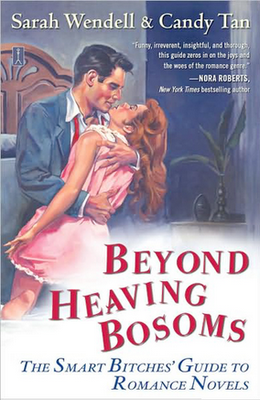Beyond Heaving Bosoms: The Smart Bitches’ Guide to Romance Novels

Romance is a huge market, the most popular kind of fiction—and one of the most maligned. In the introductory chapter of Beyond Heaving Bosoms, the authors quip, “Let’s face it: romance novels, with their titty-licious covers, overwrought cover copy, and genre constraints are an easier piñata to smack around than most.” Despite the genre’s flaws, the authors started their blog, Smart Bitches, Trashy Books, because they love romance novels and didn’t think it was receiving the in-depth scrutiny it deserved as fiction’s greatest money-maker. They ask, “Are romance novels really candy-coated porn or vehicles by which we understand our sexual and gender politics?” The short answer is: quite possibly, both.
Whether you love romance, or love to mock it—or, like the authors, both—there’s plenty to enjoy in Beyond Heaving Bosoms. Instead of numbered chapters, the book is divided into sections such as “Chapter Cleavage,” “Chapter Codpiece,” and “Chapter Secret Cowboy Baby.” There’s plenty of lovingly-written satire in the Smart Bitches Dictionary, the “Mad Libs” section, and a lengthy “interactive” romance parody in the style of the once-popular “Choose Your Own Adventure” novels. There are e-mails between members of the International Consortium of Heroes, a hypothetical hero and heroine pleading their case before Judge Judy, the Ten Commandments of Heroine Conduct, and an entire chapter devoted to the mockery of ridiculous cover art.
In addition to all the fun and games, there is insightful literary criticism. The book manages to be educational and subtly persuasive, as well as hilarious. The authors identify protagonist and villain archetypes, investigate the tying together of virginity and purity, re-imagine the romance novel as a coming-of-age narrative, and meditate on the cultural implications of “the heroine’s irresistible Magic Hoo Hoo and the hero’s untamable Wang of Mighty Lovin’.”
It’s hard to deny that by and large, romance novels are problematic for feminists. There are certainly feminists who love romance, but some common genre conventions are hopelessly misogynist. Rape is common in what the authors label “Old Skool Romance,” and within the confines of a book’s story, it is often seen as an acceptable means of “seduction.” But, they note that the genre has gone through a lot of changes in the last few decades, and as societal attitudes about rape have changed, its treatment in literature has also evolved. Perhaps paradoxically, there is no other genre that celebrates female sexuality and pleasure so enthusiastically. Romance is a genre written by women and read by women, and it is a wide umbrella with room for feminism underneath.
I loved that book, and I read romance novels all the time. I think as a whole, the genre has a lot of feminist writers and plots. I think its easy to say things about the genre- romance is ripe to say mean things about because its by women for women, so we need to actually be aware that that can be the reason people mock it. But, hey, there is nothing wrong with loving a book about emotions (with a healthy dose of sexy sex)